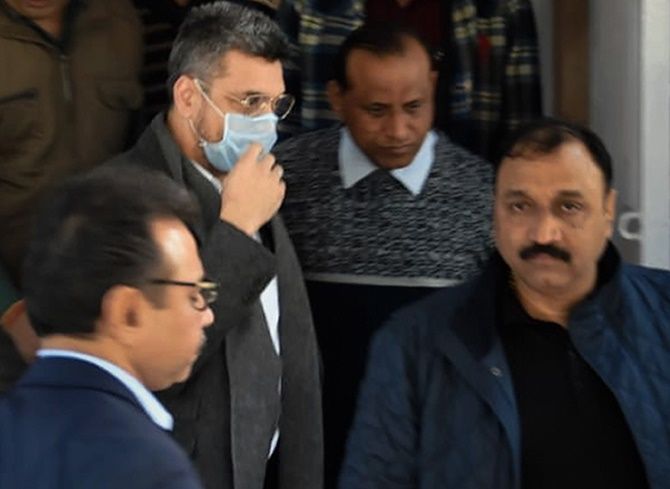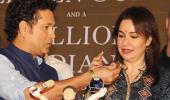
The Delhi High Court on Wednesday upheld a trial court's decision to grant bail to Sanjeev Chawla, an alleged bookie and key accused in one of the cricket's biggest match-fixing scandals that involved former South African captain Hansie Cronje, saying when the scenario of a trial taking place was "stark", the liberty of a person "cannot be left in limbo" on the belief that he was a flight risk.
While dismissing the police's plea challenging the bail granted to Chawla in the case in which the FIR was lodged 20 years ago, Justice Asha Menon said the instant case highlights the need for use of technology, like the GPS tracking system used in United States, to track under-trials in cases where there is a fear that they may flee.
"This case brings to the fore the need for investigative agencies and the Government to consider the use of advances in technology to track under-trials in cases of this nature where the State may fear that an accused may flee from trial.
"Digital and electronic equipment, as presently used in America, ought to be introduced in India, so that a tracking system similar to the GPS Tracking System, can be used to monitor the movement of the accused released on bail, allowing the authorities to gather information all the time while permitting the accused to undertake the usual and ordinary activities of normal life," the court said.
It said in the absence of such technology, the trial court adopted the next best course available by directing Chawla to keep a mobile phone operational at all times.
Adding to the bail conditions, the high court said apart from Chawla and his brother, the two sureties shall also furnish the details of their mobile phones to the SHO/IO and keep their mobile phones operational at all times.
"Further, the respondent/accused (Chawla) shall make a call to the IO/SHO once a day and shall not leave Delhi except with the permission of the trial court. The respondent/accused shall not leave the country till the trial is concluded, which the State shall endeavour to expedite.
"The petitioner/State would be entitled to alert all exit/transit points accordingly, to ensure that there is no attempt by the respondent/accused to leave the country," the high court said.
The police, represented by Additional Solicitor General Sanjay Jain and additional public prosecutor Kewal Singh Ahuja,аhad sought cancellation of the bail primarily on the ground of gravity of offence, which has international ramifications, and also that the guidelines for release in view of the coronavirus pandemic were not to be applied in the instant case as was done by the trial court.
They contended that considerable time was taken to extradite Chawla to India from UK and he was financially well off and connected and therefore, a flight risk.
Senior advocate Vikas Pahwa, appearing for Chawla, opposed the police plea and said there was no evidence to suggest that he was likely to abscond during the complete lockdown with no mode of transport including flights suspended.
He argued the trial was pending for seven years, the charges have not been framed and it will take considerable time to complete the trial and the plea to cancel the bail was not maintainable and while the Supreme Court and high court are de-congesting jails to contain the spread of COVID-19 or coronavirus, the police is keeping the accused in prison.
The court said that while the concerns of the police are genuine, "it cannot be overlooked" that out of the remaining four accused persons three were arrested in the year 2000 when the FIR was registered.
"Till date, admittedly, not even the charge has been framed against any one of them. The other three accused persons have been on bail since the year 2000 and 20 years later, they continue to remain on bail with no trial in sight. The trial scenario being so stark, liberty of a person cannot be left in limbo only on account of the belief of the State that the respondent/accused is a flight risk," it said.
It said the police came to court seeking cancellation of bail immediately after it was granted and therefore, there was "no occasion for a disclosure through action or words, that the accused has or intends to thwart the process of justice or prevent fair trial".
"Liberty being precious to human life, bail once granted ought not to be lightly cancelled. The State (police) has not succeeded in making out a case for cancellation of bail of the respondent/accused," the high court said.
Chawla, who was extradited from London in February, was granted bail by the trial court here on April 30 on furnishing of a personal bond of Rs 2 lakh and two sureties of the like amount.
He sought bail saying that due to the COVID-19 pandemic, there is a risk of getting infected in jail where it is difficult to maintain social distancing.
The trial court, while granting bail said the accused was in custody for the last 76 days and the probe was already complete in the case.
It, however, directed him to give his voice sample and handwriting specimen to the investigating officer in the case.
According to the police, Chawla was allegedly involved in fixing of five matches and Cronje, who died in a plane crash in 2002, was also involved. Chawla was alleged to have played a central role in conspiring with Cronje to fix a South African tour to India in February-March, 2000.
The British court documents say that Chawla is a Delhi-born businessman who moved to the United Kingdom on a business visa in 1996 and continued to make trips to India.












 © 2025
© 2025